基于COCA词频表的文本词汇分布测试工具v0.1
美国语言协会对美国人日常使用的英语单词做了一份详细的统计,按照日常使用的频率做成了一张表,称为COCA词频表。排名越低的单词使用频率越高,该表可以用来统计词汇量。
如果你的词汇量约为6000,那么这张表频率6000以下的单词你应该基本都认识。(不过国内教育平时学的单词未必就是他们常用的,只能说大部分重合)
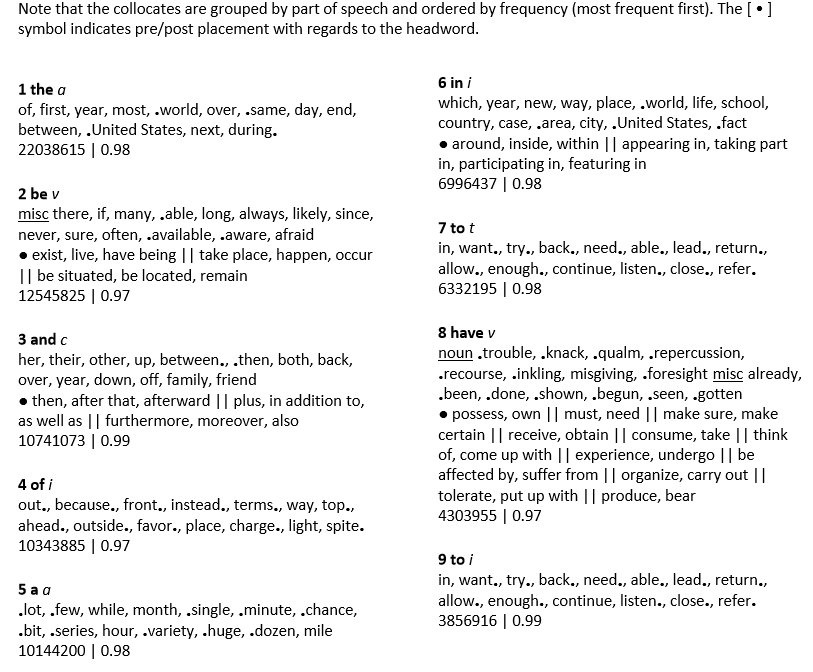
我一直有个想法,要是能用COCA词频表统计一本小说中所有的词汇都是什么等级的,然后根据自己的词汇量,就能大致确定这本小说是什么难度,自己能不能读了。
学习了C++的容器和标准库算法后,我发现这个想法很容易实现,于是写了个能够统计文本词频的小工具。现在只实现了基本功能,写得比较糙。还有很多要改进的地方,随着以后的学习,感觉这个工具还是可以再深挖的。
v0.1
1.可逐个分析文本中的每一个单词并得到其COCA词频,生成统计报告。
2.仅支持txt。
实现的重点主要分三块。
(1)COCA词典的建立
首先建立出COCA词典。我使用了恶魔的奶爸公众号提供的txt格式的COCA词频表,这张表是经过处理的,每行只有一个单词和对应的频率,所以读取起来很方便。
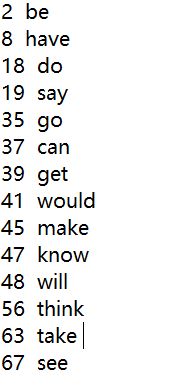
读取文本后,用map容器来建立“单词——频率”的一对一映射。
要注意的是有些单词因为使用意思和词性的不同,统计表里会出现两个频率,也就是熟词的偏僻意思。我只取了较低的那个为准,因为你读文本时,虽然可能不是真正的意思但起码这个单词是认识的,而且这种情况总体来说比较少见,所以影响不大。
存储时我用了26组map,一个首字母存一组,单词查询时按首字母查找。可能有更有效率的办法。
(2)单词的获取和处理
使用get()方法逐个获取文本的字符。
使用vector容器存储读到的文本内容。如果是字母或连字符就push进去,如果不是,就意味着一个单词读完了,接着开始处理,把读到的文本内容assign到一个字符串中组成完整的单词,然后根据其首字母查找词频。
每个单词查到词频后,使用自定义的frequency_classify()区分它在什么范围,再用word_frequency_analyze()统计在不同等级的分布。
最后报告结果,显示出每个等级的百分比。
(3)单词的修正
首先是分析过的单词不会再分析第二遍,因为一般原文中像I,he,she,it,a,this,that这种特别常见的词还是很多的,如果每个都统计进去,会导致不同文章看到的结果都是高频词占到80%,90%。应该以单词的种类为准,而不是数量。
其次有很多单词的变形COCA词频表是不统计的,像许多单词的过去式,复数,进行时等,还有was,were,has,had等。所以我单独加了word_usual_recheck()和word_form_recheck()两个函数来检查是否有这些情况,如果有变形的话,就变为原型再尝试查找一次。但是这样做相当于手动修正,不能覆盖到所有情况,比如有些单词的变形并不遵循传统。
我先用了乔布斯斯坦福大学的演讲稿测试。测试结果:
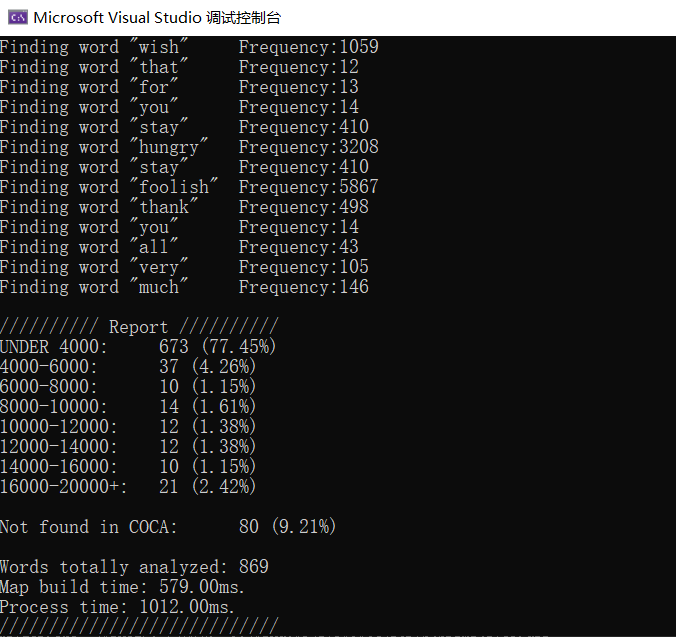
总共分析了869个单词,77.45%的单词都找到了,且分布在4000以下,可见演讲稿使用的绝大多数的单词都是极其常用的单词,有4000以上的词汇量就基本能读懂。
我再测试了一下《小王子》的原文。
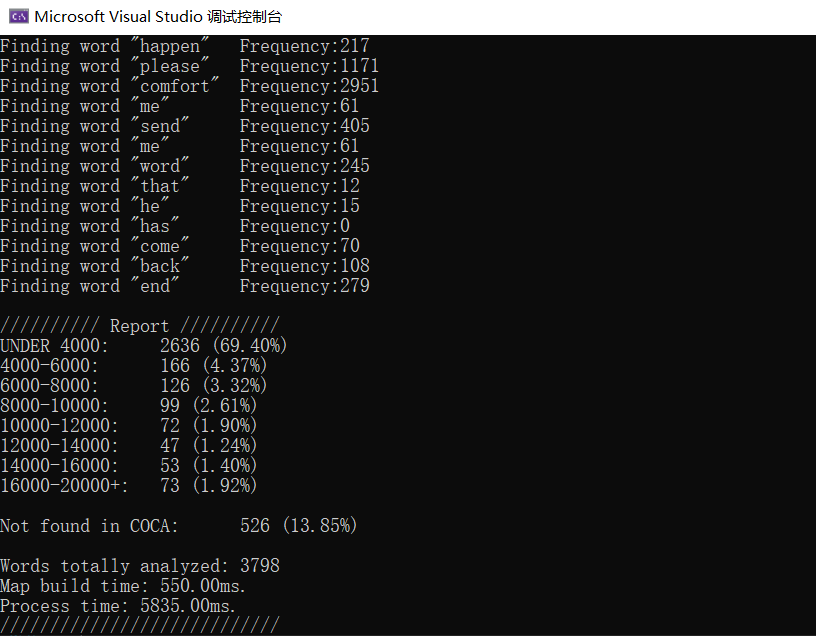
约70%的单词都找到了,且分布在4000以下,再加上4000-8000之间的,总共有接近80%的单词是六七千以下的级别。
为了对比,我再随便找了一篇纽约客上的文章测试。
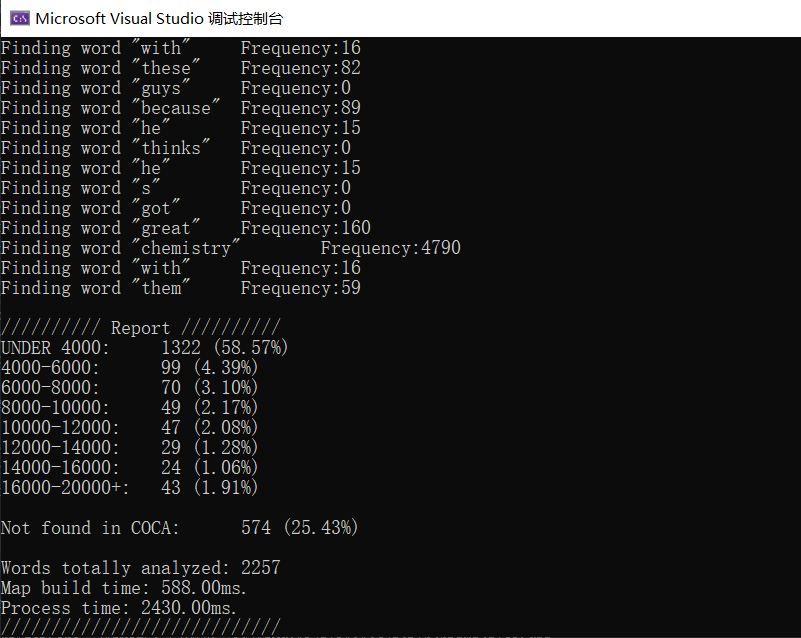
可以看到,高频词的比例明显降低了一些,约有10%的单词是8000以上的级别,还有更多的单词找不到了,说明出现了许多单词的变形,当然也可能包括人名,毕竟是讨论政治的文章,还有小部分可能是超出20000。
以下是代码。
TextVolcabularyAnalyzer.cpp
1 #include <iostream>
2 #include <fstream>
3 #include <string>
4 #include <algorithm>
5 #include <array>
6 #include <vector>
7 #include <iterator>
8 #include <map>
9 #include <numeric>
10 #include <iomanip>
11 #include <ctime>
12
13 #define COCA_WORDS_NUM 20201U
14 #define WORDS_HEAD_NUM 26U
15
16 #define WORDS_HEAD_A 0U
17 #define WORDS_HEAD_B 1U
18 #define WORDS_HEAD_C 2U
19 #define WORDS_HEAD_D 3U
20 #define WORDS_HEAD_E 4U
21 #define WORDS_HEAD_F 5U
22 #define WORDS_HEAD_G 6U
23 #define WORDS_HEAD_H 7U
24 #define WORDS_HEAD_I 8U
25 #define WORDS_HEAD_J 9U
26 #define WORDS_HEAD_K 10U
27 #define WORDS_HEAD_L 11U
28 #define WORDS_HEAD_M 12U
29 #define WORDS_HEAD_N 13U
30 #define WORDS_HEAD_O 14U
31 #define WORDS_HEAD_P 15U
32 #define WORDS_HEAD_Q 16U
33 #define WORDS_HEAD_R 17U
34 #define WORDS_HEAD_S 18U
35 #define WORDS_HEAD_T 19U
36 #define WORDS_HEAD_U 20U
37 #define WORDS_HEAD_V 21U
38 #define WORDS_HEAD_W 22U
39 #define WORDS_HEAD_X 23U
40 #define WORDS_HEAD_Y 24U
41 #define WORDS_HEAD_Z 25U
42
43 #define USUAL_WORD_NUM 17U
44
45 using namespace std;
46
47 typedef enum WordFrequencyType
48 {
49 WORD_UNDER_4000 = 0,
50 WORD_4000_6000,
51 WORD_6000_8000,
52 WORD_8000_10000,
53 WORD_10000_12000,
54 WORD_12000_14000,
55 WORD_14000_16000,
56 WORD_OVER_16000,
57 WORD_NOT_FOUND_COCA,
58 WORD_LEVEL_NUM
59 }TagWordFrequencyType;
60
61 const string alphabet_str = "abcdefghijklmnopqrstuvwxyz";
62
63 const string report_str[WORD_LEVEL_NUM] = {
64 "UNDER 4000: ",
65 "4000-6000: ",
66 "6000-8000: ",
67 "8000-10000: ",
68 "10000-12000: ",
69 "12000-14000: ",
70 "14000-16000: ",
71 "16000-20000+: ",
72 "\nNot found in COCA:"
73 };
74
75 //for usual words not included in COCA
76 const string usual_w_out_of_COCA_str[USUAL_WORD_NUM] =
77 {
78 "s","is","are","re","was","were",
79 "an","won","t","has","had","been",
80 "did","does","cannot","got","men"
81 };
82
83 bool word_usual_recheck(const string &ws)
84 {
85 bool RetVal = false;
86 for (int i = 0; i < USUAL_WORD_NUM;i++)
87 {
88 if (ws == usual_w_out_of_COCA_str[i])
89 {
90 RetVal = true;
91 }
92 else
93 {
94 //do nothing
95 }
96 }
97 return RetVal;
98 }
99
100 bool word_form_recheck(string& ws)
101 {
102 bool RetVal = false;
103 if (ws.length() > 3)
104 {
105 char e1, e2,e3;
106 e3 = ws[ws.length() - 3]; //last but two letter
107 e2 = ws[ws.length() - 2]; //last but one letter
108 e1 = ws[ws.length() - 1]; //last letter
109
110 if (e1 == 's')
111 {
112 ws.erase(ws.length() - 1);
113 RetVal = true;
114 }
115 else if (e2 == 'e' && e1 == 'd')
116 {
117 ws.erase(ws.length() - 1);
118 ws.erase(ws.length() - 1);
119 RetVal = true;
120 }
121 else if (e3 == 'i' && e2 == 'n' && e1 == 'g')
122 {
123 ws.erase(ws.length() - 1);
124 ws.erase(ws.length() - 1);
125 ws.erase(ws.length() - 1);
126 RetVal = true;
127 }
128 else
129 {
130 //do nothing
131 }
132 }
133
134 return RetVal;
135 }
136
137 TagWordFrequencyType frequency_classify(const int wfrq)
138 {
139 if (wfrq == 0)
140 {
141 return WORD_NOT_FOUND_COCA;
142 }
143 else if (wfrq > 0 && wfrq <= 4000)
144 {
145 return WORD_UNDER_4000;
146 }
147 else if (wfrq > 4000 && wfrq <= 6000)
148 {
149 return WORD_4000_6000;
150 }
151 else if (wfrq > 6000 && wfrq <= 8000)
152 {
153 return WORD_6000_8000;
154 }
155 else if (wfrq > 8000 && wfrq <= 10000)
156 {
157 return WORD_8000_10000;
158 }
159 else if (wfrq > 10000 && wfrq <= 12000)
160 {
161 return WORD_10000_12000;
162 }
163 else if (wfrq > 12000 && wfrq <= 14000)
164 {
165 return WORD_12000_14000;
166 }
167 else if (wfrq > 14000 && wfrq <= 16000)
168 {
169 return WORD_14000_16000;
170 }
171 else
172 {
173 return WORD_OVER_16000;
174 }
175 }
176
177 void word_frequency_analyze(array<int, WORD_LEVEL_NUM> & wfrq_array, TagWordFrequencyType wfrq_tag)
178 {
179 switch (wfrq_tag)
180 {
181 case WORD_UNDER_4000:
182 {
183 wfrq_array[WORD_UNDER_4000] += 1;
184 break;
185 }
186 case WORD_4000_6000:
187 {
188 wfrq_array[WORD_4000_6000] += 1;
189 break;
190 }
191 case WORD_6000_8000:
192 {
193 wfrq_array[WORD_6000_8000] += 1;
194 break;
195 }
196 case WORD_8000_10000:
197 {
198 wfrq_array[WORD_8000_10000] += 1;
199 break;
200 }
201 case WORD_10000_12000:
202 {
203 wfrq_array[WORD_10000_12000] += 1;
204 break;
205 }
206 case WORD_12000_14000:
207 {
208 wfrq_array[WORD_12000_14000] += 1;
209 break;
210 }
211 case WORD_14000_16000:
212 {
213 wfrq_array[WORD_14000_16000] += 1;
214 break;
215 }
216 case WORD_OVER_16000:
217 {
218 wfrq_array[WORD_OVER_16000] += 1;
219 break;
220 }
221 default:
222 {
223 wfrq_array[WORD_NOT_FOUND_COCA] += 1;
224 break;
225 }
226 }
227 }
228
229 bool isaletter(const char& c)
230 {
231 if ((c >= 'a' && c <= 'z') || (c >= 'A' && c<= 'Z'))
232 {
233 return true;
234 }
235 else
236 {
237 return false;
238 }
239 }
240
241 int main()
242 {
243 //file init
244 ifstream COCA_txt("D:\\COCA.txt");
245 ifstream USER_txt("D:\\test.txt");
246
247 //time init
248 clock_t startTime, endTime;
249 double build_map_time = 0;
250 double process_time = 0;
251
252 startTime = clock(); //build time start
253
254 //build COCA words map
255 map<string, int> COCA_WordsList[WORDS_HEAD_NUM];
256 int readlines = 0;
257
258 while (readlines < COCA_WORDS_NUM)
259 {
260 int frequency = 0; string word = "";
261 COCA_txt >> frequency;
262 COCA_txt >> word;
263
264 //transform to lower uniformly
265 transform(word.begin(), word.end(), word.begin(), tolower);
266
267 //import every word
268 for (int whead = WORDS_HEAD_A; whead < WORDS_HEAD_NUM; whead++)
269 {
270 //check word head
271 if (word[0] == alphabet_str[whead])
272 {
273 //if a word already exists, only load its lower frequency
274 if (COCA_WordsList[whead].find(word) == COCA_WordsList[whead].end())
275 {
276 COCA_WordsList[whead].insert(make_pair(word, frequency));
277 }
278 else
279 {
280 COCA_WordsList[whead][word] = frequency < COCA_WordsList[whead][word] ? frequency : COCA_WordsList[whead][word];
281 }
282 }
283 else
284 {
285 // do nothing
286 }
287 }
288 readlines++;
289 }
290
291 endTime = clock(); //build time stop
292 build_map_time = (double)(endTime - startTime) / CLOCKS_PER_SEC;
293
294 //user prompt
295 cout << "COCA words list imported.\nPress any key to start frequency analysis...\n";
296 cin.get();
297
298 startTime = clock(); //process time start
299
300 //find text words
301 vector<char> content_read;
302 string word_readed;
303 vector<int> frequecy_processed = { 0 };
304 array<int, WORD_LEVEL_NUM> words_analysis_array{ 0 };
305 char char_read = ' ';
306
307 //get text char one by one
308 while (USER_txt.get(char_read))
309 {
310 //only letters and '-' between letters will be received
311 if (isaletter(char_read) || char_read == '-')
312 {
313 content_read.push_back(char_read);
314 }
315 else
316 {
317 //char which is not a letter marks the end of a word
318 if (!content_read.empty()) //skip single letter
319 {
320 int current_word_frequency = 0;
321
322 //assign letters to make the word
323 word_readed.assign(content_read.begin(), content_read.end());
324 transform(word_readed.begin(), word_readed.end(), word_readed.begin(), tolower);
325
326 cout << "Finding word \"" << word_readed << "\" \t";
327 cout << "Frequency:";
328
329 //check the word's head and find its frequency in COCA list
330 for (int whead = WORDS_HEAD_A; whead < WORDS_HEAD_NUM; whead++)
331 {
332 if (word_readed[0] == alphabet_str[whead])
333 {
334 cout << COCA_WordsList[whead][word_readed];
335 current_word_frequency = COCA_WordsList[whead][word_readed];
336
337 //check if the word has been processed
338 if (current_word_frequency == 0)
339 {
340 //addtional check
341 if (word_usual_recheck(word_readed))
342 {
343 word_frequency_analyze(words_analysis_array, WORD_UNDER_4000);
344 }
345 else if (word_form_recheck(word_readed))
346 {
347 current_word_frequency = COCA_WordsList[whead][word_readed]; //try again
348 if (current_word_frequency > 0)
349 {
350 frequecy_processed.push_back(current_word_frequency);
351 word_frequency_analyze(words_analysis_array, frequency_classify(current_word_frequency));
352 }
353 else
354 {
355 // do nothing
356 }
357 }
358 else
359 {
360 word_frequency_analyze(words_analysis_array, WORD_NOT_FOUND_COCA);
361 }
362 }
363 else if (find(frequecy_processed.begin(), frequecy_processed.end(), current_word_frequency)
364 == frequecy_processed.end())
365 {
366 //classify this word and make statistics
367 frequecy_processed.push_back(current_word_frequency);
368 word_frequency_analyze(words_analysis_array, frequency_classify(current_word_frequency));
369 }
370 else
371 {
372 // do nothing
373 }
374 }
375 else
376 {
377 //do nothing
378 }
379 }
380 cout << endl;
381
382 //classify this word and make statistics
383 //word_frequency_analyze(words_analysis_array, frequency_classify(current_word_frequency));
384 content_read.clear();
385 }
386 else
387 {
388 //do nothing
389 }
390 }
391 }
392
393 endTime = clock(); //process time stop
394 process_time = (double)(endTime - startTime) / CLOCKS_PER_SEC;
395
396 //calc whole words processed
397 int whole_words_analyzed = 0;
398 whole_words_analyzed = accumulate(words_analysis_array.begin(), words_analysis_array.end(), 0);
399
400 //report result
401 cout << "\n////////// Report ////////// \n";
402 for (int i = 0;i< words_analysis_array.size();i++)
403 {
404 cout << report_str[i] <<"\t"<< words_analysis_array[i] << " (";
405 cout<<fixed<<setprecision(2)<<(float)words_analysis_array[i] * 100 / whole_words_analyzed << "%)" << endl;
406 }
407 cout << "\nWords totally analyzed: " << whole_words_analyzed << endl;
408
409 //show run time
410 cout << "Map build time: " << build_map_time*1000 << "ms.\n";
411 cout << "Process time: " << process_time*1000 << "ms.\n";
412 cout << "////////////////////////////" << endl;
413
414 //close file
415 COCA_txt.close();
416 USER_txt.close();
417
418 return 0;
419 }
基于COCA词频表的文本词汇分布测试工具v0.1的更多相关文章
- 基于COCA词频表的文本词汇分布测试工具v0.2
update: 简单整理了一下代码的组织. 处理的单词封装成类,单词的修正,信息的显示都作为其内的方法. 写得还比较糙,工具本身可以封装,还有对于单词的变形基本没什么处理,以后有时间再改. 项目托管到 ...
- 基于Text-CNN模型的中文文本分类实战 流川枫 发表于AI星球订阅
Text-CNN 1.文本分类 转眼学生生涯就结束了,在家待就业期间正好有一段空闲期,可以对曾经感兴趣的一些知识点进行总结. 本文介绍NLP中文本分类任务中核心流程进行了系统的介绍,文末给出一个基于T ...
- 基于Text-CNN模型的中文文本分类实战
Text-CNN 1.文本分类 转眼学生生涯就结束了,在家待就业期间正好有一段空闲期,可以对曾经感兴趣的一些知识点进行总结. 本文介绍NLP中文本分类任务中核心流程进行了系统的介绍,文末给出一个基于T ...
- 基于jquery的bootstrap在线文本编辑器插件Summernote
Summernote是一个基于jquery的bootstrap超级简单WYSIWYG在线编辑器.Summernote非常的轻量级,大小只有30KB,支持Safari,Chrome,Firefox.Op ...
- Chinese-Text-Classification,用卷积神经网络基于 Tensorflow 实现的中文文本分类。
用卷积神经网络基于 Tensorflow 实现的中文文本分类 项目地址: https://github.com/fendouai/Chinese-Text-Classification 欢迎提问:ht ...
- Android版数据结构与算法(四):基于哈希表实现HashMap核心源码彻底分析
版权声明:本文出自汪磊的博客,未经作者允许禁止转载. 存储键值对我们首先想到HashMap,它的底层基于哈希表,采用数组存储数据,使用链表来解决哈希碰撞,它是线程不安全的,并且存储的key只能有一个为 ...
- HDFS的快照原理和Hbase基于快照的表修复
前一篇文章<HDFS和Hbase误删数据恢复>主要讲了hdfs的回收站机制和Hbase的删除策略.根据hbase的删除策略进行hbase的数据表恢复.本文主要介绍了hdfs的快照原理和根据 ...
- js语言评价--js 基于哈希表、原型链、作用域、属性类型可配置的多范式编程语言
js 基于哈希表.原型链.作用域.属性类型可配置的多范式编程语言 值类型.引用类型.直接赋值: 原型是以对象形式存在的类型信息. ECMA-262把对象定义为:无序属性的集合,其属性可以包含基本值,对 ...
- mysql中【update/Delete】update中无法用基于被更新表的子查询,You can't specify target table 'test1' for update in FROM clause.
关键词:mysql update,mysql delete update中无法用基于被更新表的子查询,You can't specify target table 'test1' for update ...
随机推荐
- 泊松分布算法的应用:开一家4S店
王老板开了一家4S店,卖新车为主,车型也很单一,可是每个月销量都变化很大,他很头疼,该怎么备货,头疼的是: 1)备货少了,可以来了没货可能就不买,去别的店了 2)备货多了,占用库存不说,长久卖不出去就 ...
- 初学WebGL引擎-BabylonJS:第1篇-基础构造
继续上篇随笔 步骤如下: 一:http://www.babylonjs.com/中下载源码.获取其中babylon.2.2.js.建立gulp项目
- C# Beanstalkd Client
http://bestmike007.com/Beanstalkd.Client/ Other Message Queue http://queues.io
- Vue文件模板
<template> <div> </div> </template> <script> export default { } </s ...
- 正则表达式在Java中应用的三种典型场合:验证,查找和替换
正则式在编程中常用,总结在此以备考: package regularexp; import java.util.regex.Matcher; import java.util.regex.Patter ...
- ubuntu安装docker-ce 、docker-ce-cli、containerd.io
问题 ubuntu安装docker的时候特别慢,百度搜了一大堆都没讲到点子上,最后请教了大佬才知道是源的问题 安装 修改源 sudo gedit /etc/apt/sources.list 添加源 阿 ...
- 现有 Vue.js 项目快速实现多语言切换的一种思路
Web 项目多语言(i18n,即国际化)是比较常见的需求,常规的做法大概有以下几种: 每种语言单独开发页面,适用于 CMS 之类的网站 多语言文本和页面结构分离,运行时动态替换.适用于单页应用(SPA ...
- Mysql 多表连查 xml写法 非注解形式
1.xml写法 <!-- 联查用户users表 --> <resultMap type="nanh.entity.Tasks" id="selectTa ...
- 云计算openstack核心组件——keystone身份认证服务(5)
一.Keystone介绍: keystone 是OpenStack的组件之一,用于为OpenStack家族中的其它组件成员提供统一的认证服务,包括身份验证.令牌的发放和校验.服务列表.用户 ...
- Vue iview可收缩多级菜单的实现
递归组件实战 views/layout.vue <template> <div class="layout-wrapper"> <Layout cla ...
